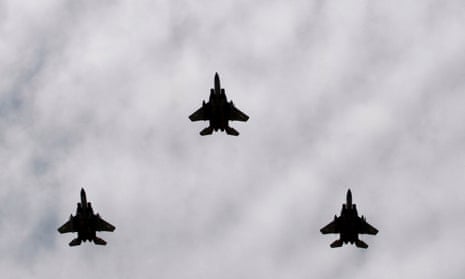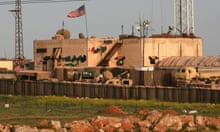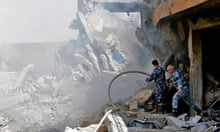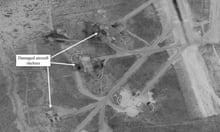Israeli warplanes bombed a Syrian regime airbase east of the city of Homs, the Russian and Syrian militaries have said.
The Russian military said two Israeli F-15 jets carried out the strikes from Lebanese airspace, and that Syrian air defence systems shot down five of eight missiles fired. Asked about the Russian statement, an Israeli military spokesman said he had no immediate comment.
Syrian state TV reported loud explosions near the T-4 airfield in the desert east of Homs in the early hours of Monday. It initially reported that the attack was “most likely” American, a claim the Pentagon has denied.
Video footage on social media in Lebanon showed aircraft or missiles flying low over the country, apparently heading east towards Syria. At least 14 people, mostly Iranians or members of Iran-backed groups, were killed, the UK-based Syrian Observatory for Human Rights monitoring group said. The Iranian Fars news agency confirmed three Iranian deaths.
T-4, also known as Tiyas, halfway between Homs and the ancient ruins of Palmyra, has been used by the Russian air force, but it is unclear whether Russian aircraft were at the base when it came under attack.
Concerned by the permanent stationing of Iranian-backed troops on its border, Israel has a track record of conducting independent strikes inside Syria, largely with tacit rather than explicit US support. It previously launched airstrikes against the T-4 base in February, claiming that an Iranian drone launched from the airfield had flown into Israel.
Of most concern to Israeli military officials is what they believe are Iranian efforts to fix advanced guidance systems to rudimentary rockets, some of which are destined for Hezbollah in Lebanon.
Israel was dismayed by Donald Trump’s announcement last week that he intended to withdraw US troops from Syria. The Israeli prime minister, Benjamin Netanyahu, regards US involvement as the best guarantee that Iranian influence in Syria can be curbed.
Though remaining a strong ally, senior Israeli officials have come to view the the Trump administration as chaotic and unreliable, incapable of articulating a policy in Syria. Military officials believe that torpor in the State Department and Pentagon – where bilateral relationships with Israel have long been strongest – and unchecked volatility in the White House, have forced Israel to act solely in its own interests in Syria. It insists that regime change is not a goal, and nor is weakening the regime, unless that is caught up in the primary goal of weakening Iran.
On Sunday Trump said the Syrian regime and its backers would pay a “high price” for the use of chemical weapons in an attack on Saturday on rebel-held Douma that killed 42 people, but the Pentagon denied US forces were involved in Monday’s strikes. “However, we continue to closely watch the situation and support the ongoing diplomatic efforts to hold those who use chemical weapons, in Syria and otherwise, accountable,” a Pentagon spokesman said.
Separately, the White House put out an account of a telephone conversation between Trump and Emmanuel Macron, in which the US and French presidents “agreed to exchange information on the nature of the attacks and coordinate a strong, joint response”.
Macron has said chemical weapons attacks in Syria would cross a “red line” for France and that French forces would strike if the regime was proven to have been involved. However, the French army denied responsibility for Monday’s attack.
The UN security council is scheduled to meet on Monday to discuss Saturday’s chemical weapons attack in Douma.
Aid workers and local medics described apocalyptic scenes as they scrambled to save the survivors of Syria’s latest atrocity. Many of the dead had had been sheltering in the basement of a building that was struck by a projectile shortly after 7.30pm. Ill-equipped local doctors said they treated patients for suffocation, foaming at the mouth, dilated pupils and burned eyes.
The attack was only the latest salvo in a massive bombardment that began on Friday night and lasted until Sunday morning, to pressure local rebels and the opposition to leave the city, surrounded by forces loyal to Bashar al-Assad.
On Sunday evening an agreement was reached between rebels in Douma and the Russian government. The local negotiation committee said fighters from the rebel group Jaish al-Islam would be exiled to northern Syria, to areas controlled by the opposition.
Civilians who wished to leave Douma could also depart on the buses, which began arriving in the early hours of Monday morning.
The agreement provides for the entry of Russian military police into Douma, supposedly as a guarantor to ensure the Assad regime does not prosecute civilians who decide to stay in their homes instead of being forcibly displaced. Those who stay, per the agreement, will have their status with the Syrian regime resolved and cannot be called for the mandatory military service for six months.










